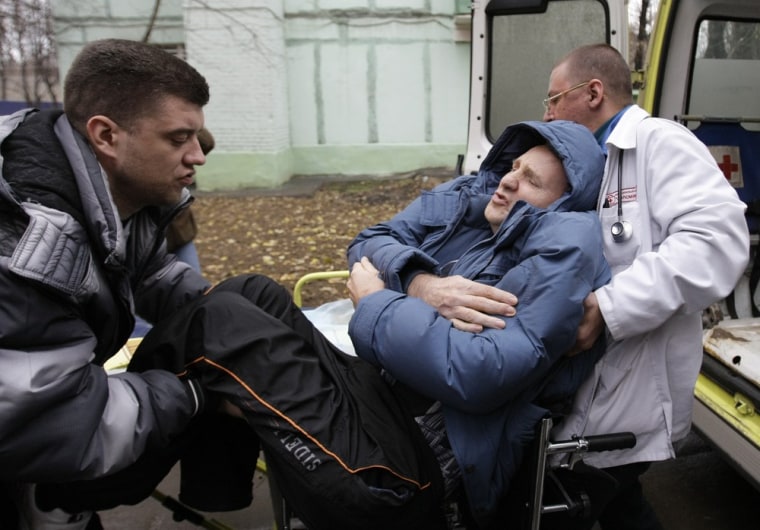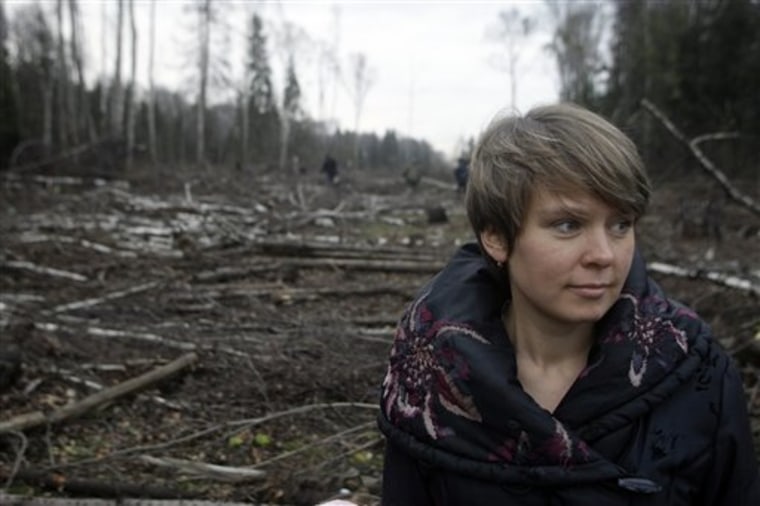Cars heading out of Moscow on a new 12-lane highway zip along until they hit city limits and cross into this satellite town, where the road narrows to six lanes and traffic comes to a halt.
Few question that the gridlock is intolerable. But the government's solution — to reroute the highway through a centuries-old oak forest — has unleashed an uproar involving some of Russia's most intractable issues: corruption, land use and the abuse of power.
Journalists have been beaten, the president has ordered a construction halt, and Russia's broadest protest movement in years has sprung up despite fears that greedy officials are willing to kill to get their way.
The struggle pits officials intent on unblocking the highway, and making millions along the way, against nature-lovers desperate to save the last spot of green in a town that has otherwise been devoured by Moscow's urban sprawl.
A drive through Khimki on the Leningradka highway that connects Moscow to St. Petersburg can take hours even in the middle of the afternoon.
Soviet-era trucks belch exhaust as they creep forward in low gear. Buses wait helplessly in the right lane, and anyone hoping to make a flight at the nearby Sheremetyevo international airport starts looking at their watch with ever growing frustration.
Plans were made years ago to expand the highway, but the chosen route through the middle of the forest incensed local residents, who set out to save their trees.
Journalists reporting on the struggle have been brutally beaten, their skulls cracked and limbs broken. Kommersant reporter Oleg Kashin was apparently the most recent victim. The stomach-turning attack, in which Kashin was hit about 50 times by two thugs, was caught on a security camera and outraged the nation.

President Dmitry Medvedev, who has promised to fight Russia's systemic corruption, has ordered a temporary halt to the road construction so the project can be reassessed. He also has demanded that Kashin's attackers be found and punished.
Meanwhile, the Kremlin faces a snowballing protest movement as the Khimki campaign inspires people across the country to fight to save their own forests. Russians cherish their forests, but their determination to protest the destruction of nature is fed by a deep anger over the corruption that now riddles government at all levels.
Mikhail Beketov, the founder and editor of a Khimki newspaper, was among the first to raise the alarm about the destruction of the forest and suspicions that local officials were profiting from the project. He refused to back down, even after his dog was left dead on his doorstep and his car set on fire.
In November 2008, Beketov was beaten so viciously that he was left brain damaged and unable to speak. He also lost a leg and three fingers.
Sitting on his bed at home, where a rug with the image of the Virgin Mary hangs on the wall, the 52-year-old former army officer became agitated and shook his head emphatically when asked whether his assailants would ever be found.

Lyudmila Fedotova, his friend and the head of a Beketov support group, said there is little doubt about why he was attacked.
"We are all convinced that the attack on Mikhail was exclusively linked with his professional activity, because he published revealing articles ... about widespread corruption in the region and in particular about corruption linked with the clearing of the Khimsky forest," she said.
The attack on Beketov was the beginning of a wave of attacks on journalists and activists. But they did not give up, and when tree-clearing began this summer they began camping out in the forest.
Their dedication won the admiration of many in Moscow, including leaders of the political opposition. A rally in the center of Moscow in August drew about 3,000 people, the largest in many years. The city had forbidden the use of sound equipment, but that only contributed to the feeling of solidarity when one of Russia's rock stars stepped onto the stage and began to sing his popular songs. The crowd joined in and the music spread across the square.
Four days after the rally, Medvedev ordered the clearing of the forest suspended and called for public discussion of the project. It was a rare victory in Russia for social protest.
But the attacks on journalists and activists have continued as the future of the road is being decided.
Khimki activist Konstantin Fetisov was bludgeoned on the head with a baseball bat on Nov. 4 and remains in a drug-induced coma.
Two days later in central Moscow, Kashin, the Kommersant reporter, was beaten on the head and legs. Like Beketov, his hands also were mangled and he lost part of a finger. He spent several days in a drug-induced coma to protect his brain. According to his wife he was conscious Friday, though he remained on a respirator.
Road construction is one of the most corrupt sectors of Russia's economy, with numerous opportunities for kickbacks and bribes. The Khimki highway project offers more opportunities than usual for enrichment because the cleared land along the roadway also is slated for development.
Corruption in Russian road construction is so widespread that you can safely divide the contract price by two to determine the actual cost, said Vladimir Milov, an economist and prominent opposition leader who has published reports on the industry.
"Most of the kickbacks and gray economy in Russia are concentrated here," he said.
In a stark example of corruption, a new bridge across the Volga River in Volgograd was so badly built that it quivers and screeches on windy days. An investigation showed that at least $50 million was misspent.
Those who study the industry describe how it tends to work: Developers pay kickbacks to win contracts. They then skimp on materials and skim the profits, sharing some cash with corrupt officials, while bribing inspectors to look the other way.
In the case of the Khimki highway, activists and experts have suggested several other routes that bypass the forest. The current route benefits officials because they can buy the land in the forest for kopecks, said Mikhail Blinkin, director of the Scientific Research Institute of Transport and Road Engineering.
Much is at stake for Medvedev. He has vowed to fight corruption, but even he acknowledges that he has had little real success since becoming president in 2008. His promises to strengthen the rule of law also ring hollow as journalists and rights activists continue to be attacked with impunity.
Medvedev, however, has seemed determined that the assault on Kashin will be treated differently. He has demanded that his attackers be found and punished.
National television networks, which are under direct or indirect Kremlin control, have helped to feed national anger over the bludgeoning of Kashin, whose reporting did not venture into political activism.
In the aftermath of the beating, prosecutors have also re-opened the investigation into the 2008 attack on Beketov.
The fight to save the Khimki forest is now led by Yevgeniya Chirikova, whose success in getting the Kremlin to take action, has become a source of inspiration for activists around the country.
"Our movement is extremely important for the whole country," said the 33-year-old Chirikova. "Everyone looks up to us because there is a Khimki forest in every Russian region, but we often give up and say that there's nothing we can do about it."
In Zhukovsky, a town on Moscow's eastern outskirts, a rally is planned for Sunday to protest plans to cut down a local forest to build a road. Organizers expect about 2,000 people.
Anatoly Adamchuk, a reporter who has covered the controversy for a Zhukovsky newspaper, was attacked by two men outside his office this week. Police claimed the attack was staged to attract attention, but Adamchuk insists it was not.
Beketov nods and gives a worried look when asked whether he is scared for Chirikova.
The mother of two, whose phone rings every five minutes with calls from journalists and supporters, recalls that she was terrified when she saw Beketov shortly after the attack "with a hole as big as a grapefruit" in this head, but she brushes away bad thoughts.
"Either you go out there and do it and don't think about fear at all, or you leave the country because life is scary everywhere in Russia for anyone who holds any strong views."
